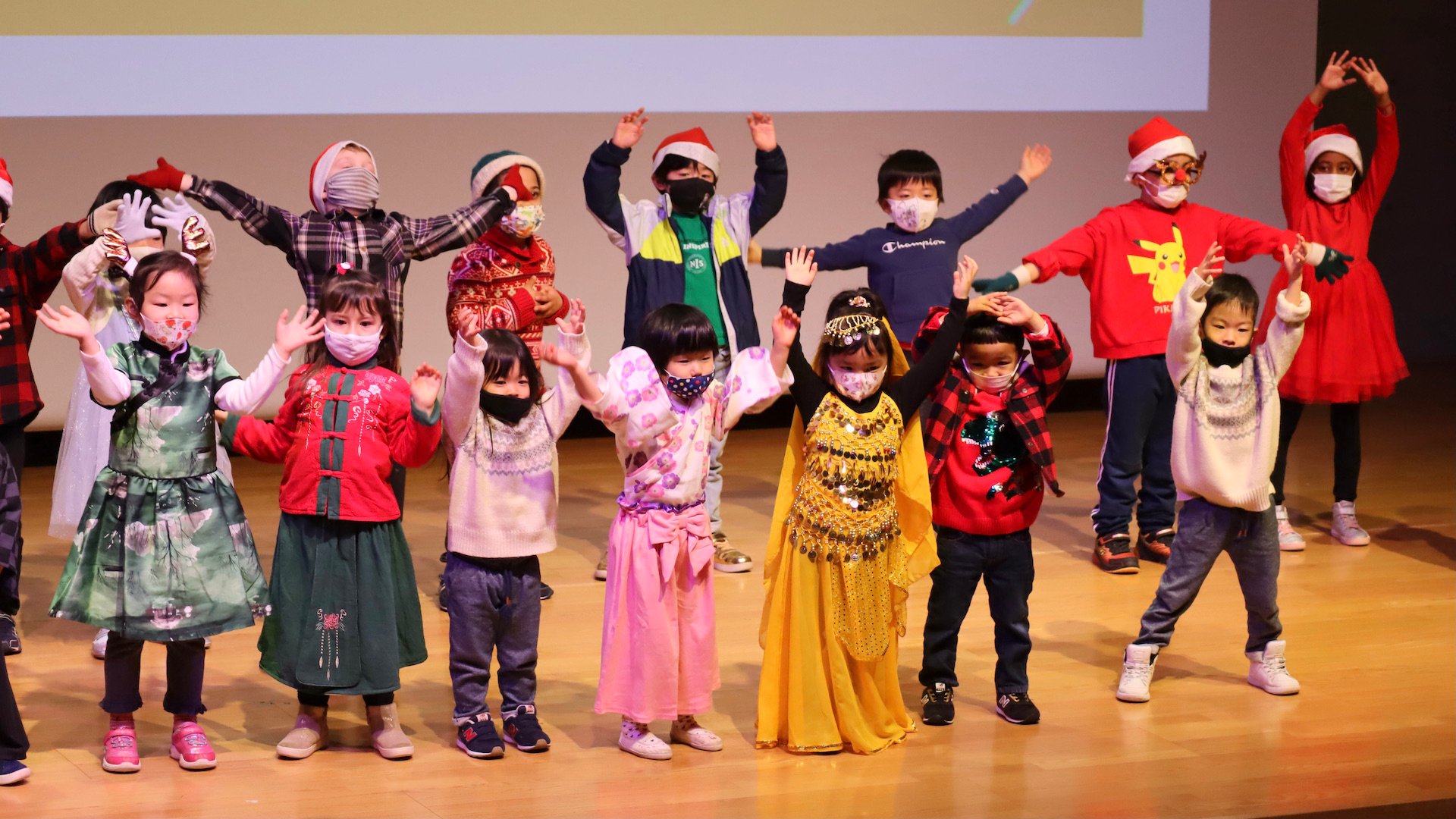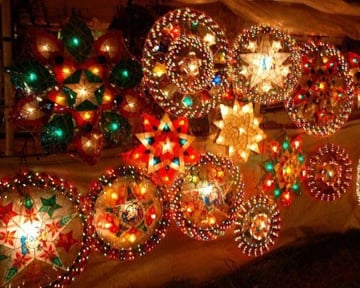
As an international school, NIS not only has a diverse student body, but we are proud of the diversity represented in our teaching staff, too! Altogether, NIS has teachers and staff from 13 countries and six continents (it's a little hard to find someone from Antarctica!). To have a little fun with the school blog at this festive time, we decided to highlight our diverse staff. We will look into the various mid-winter (or summer!) holidays they might celebrate back home and how they keep those holiday traditions alive here in Japan.
The Philippines

Let's start with the Philippines! Did you know that the Philippines are known for having the longest Christmas season? They start celebrating September 1 and will go through to mid-January! That means that even in September, you can see beautiful lights, decorations, and Nativity scenes celebrating the birth of Jesus. Many of the traditions come from Catholicism as a result of the 300-year Spanish colonial period. The Saez family (Mr. Saez is a learning support teacher in Secondary and Ms. Saez is a learning support teacher in Primary) have had their Christmas tree up since September 1 and have been singing Christmas songs ever since! And though they may not get to eat all their favorites from home, for example, Lechon (a whole roasted pig), or Queso de Bola (round Edam cheese coated with red paraffin wax), they are planning to connect with their families virtually to eat, sing, and play games together.
New Zealand
The next stop is New Zealand, where Ms. Nnadozie (Secondary Principal) is from. She shared some Maori traditions she celebrates when she is home on the marae (community meeting grounds). She explained that in Maori culture, they identify themselves with two things: the ancestral waka (canoe - that brought them to New Zealand from Hawaiki - see the movie Moana!) and the land features where their iwi (tribe) settled. For her tribe, Ati Hau Nui A Paparangi, it is Mount Ruapehu and the Wanganui River. Whenever you travel from home, you must wash before you go (in the river) and then again when you return. They say a karakia (prayerful thoughts) and physically, spiritually, and emotionally prepare, whether leaving, returning, or celebrating - this is always done. And though it is a little challenging to celebrate here in Japan, she suggested she might go down to the river by her house with a facecloth and cleanse as a way to connect to her tradition from here.
As for food, it is a little difficult to build their own Hangi (earth oven) here because…well, it just is! Even back home in New Zealand, creating the oven and preparing the food takes a community. They dig the pit and start the fire early in the morning. When the volcanic rocks are hot enough, they add the baskets of food in a particular order. .jpg?width=437&name=Hangi+at+Kakahi+Marae+2019(2).jpg) This may include a whole sheep and fresh-caught salmon. They even bake their Christmas pudding in there! They place sacks on top and then seal in the heat by adding a layer of dirt. Then they wet the pit to create steam and leave it for hours until everything is cooked. The tricky part is that you can't open it to check, so it is judged purely from experience. The recipes are passed on and given to certain family members as caretakers (Ms. Nnadozie keeps her aunt's steamed pudding recipe). The men do the digging, laying, and watching. Usually, they pass the hours by playing the ukulele, guitar, and singing.
This may include a whole sheep and fresh-caught salmon. They even bake their Christmas pudding in there! They place sacks on top and then seal in the heat by adding a layer of dirt. Then they wet the pit to create steam and leave it for hours until everything is cooked. The tricky part is that you can't open it to check, so it is judged purely from experience. The recipes are passed on and given to certain family members as caretakers (Ms. Nnadozie keeps her aunt's steamed pudding recipe). The men do the digging, laying, and watching. Usually, they pass the hours by playing the ukulele, guitar, and singing.
Ms. Nnadozie added, "The environment and our connection to specific things like the River and Mountain are important to re-center and ground oneself. Life is so busy, and it is a great time to remember that I am a small dot and that I belong to the land of my ancestors, not taking the land for granted."
Kenya
In Kenya, where Ms. Ngugi (NIS school counselor) is from, it is wedding season! As a part of her cultural traditions, the groom's family pays a dowry, or "bride price," to the bride's family. This ceremony takes place over several traditional events whereby the families visit each other and exchange the dowry or bride price. It is a token of appreciation to the family of the bride to say that "we appreciate that you have allowed us to take this woman into our family, and we recognize that you spent lots of time and money raising her. Now, as a token of appreciation, we would like to give you something back to say thank you and that we will also continue to take good care of her now as a part of our family."
Foods for wedding celebrations could include roast goat meat, rice, chapatis (flatbread), mandazi (a donut-like bread), and other traditional fares. How interesting that as many parts of the world are celebrating the winter solstice and other religious ceremonies, in Kenya, they celebrate new unions of people in love!
England
Finally, we travel to England, where Mr. Moody (College Guidance Counselor and DP Environmental Systems and Societies teacher) is from. His traditions stem from that idyllic European Christmas scene of trees decorated with baubles, a fire in the fireplace, and snowy landscapes outside…you know, the scene on greeting cards. But growing up, he tells stories about how on Christmas morning, he first opened his stocking (a long sock hanging on the fireplace that Santa fills). Among other things, there was always an orange. This is a tradition in this part of the world and hails from a time when fruit, especially oranges, were hard to find (and therefore expensive!) at that time of the year. He carried that tradition on with his own children using a mikan! He reminisced, "The tradition of the mikan reminded my kids that they should be grateful for the life they have. By and large, those of us at NIS are very fortunate, while for many, a mikan would be a treat." 
And what a beautiful sentiment! It reminds us that at this time of year, it is always great to reflect on the year we are closing with gratitude while looking forward to the year ahead with anticipation and hope. The diversity of our staff at NIS helps us celebrate the many cultures that walk through the doors here. Having a student body and dedicated teaching staff with rich cultural backgrounds helps us all be globally-minded. And for that, we are also very grateful!




.jpg?width=437&name=Hangi+at+Kakahi+Marae+2019(2).jpg) This may include a whole sheep and fresh-caught salmon. They even bake their Christmas pudding in there! They place sacks on top and then seal in the heat by adding a layer of dirt. Then they wet the pit to create steam and leave it for hours until everything is cooked. The tricky part is that you can't open it to check, so it is judged purely from experience. The recipes are passed on and given to certain family members as caretakers (Ms. Nnadozie keeps her aunt's steamed pudding recipe). The men do the digging, laying, and watching. Usually, they pass the hours by playing the ukulele, guitar, and singing.
This may include a whole sheep and fresh-caught salmon. They even bake their Christmas pudding in there! They place sacks on top and then seal in the heat by adding a layer of dirt. Then they wet the pit to create steam and leave it for hours until everything is cooked. The tricky part is that you can't open it to check, so it is judged purely from experience. The recipes are passed on and given to certain family members as caretakers (Ms. Nnadozie keeps her aunt's steamed pudding recipe). The men do the digging, laying, and watching. Usually, they pass the hours by playing the ukulele, guitar, and singing.

